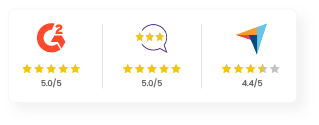6 Benefits of LMS for the Banking Industry

The Banking industry is one of the most tightly regulated and fiercely competitive sectors globally. Organizations within this industry face a number of challenges over compliance and long-term viability, driven by regulatory updates & policy changes, shifting customer preferences and growing competition.
In our regular interactions with customers, we often hear the narrative that the industry can greatly benefit from increased training efficiency, reduced costs and consistency.
Certainly, which industry wouldn’t benefit from these advantages? But Banking remains a complex sector that is constantly influenced by so many dynamics. So, to maintain that competitive edge and to ensure a standard that is consistent across their branches and offices, organizations need to invest in continuous workforce training. However, traditional training methods such as workshops and seminars often prove costly and time-intensive – especially for a bank’s distributed and dispersed workforce.
This is where a Learning Management Systems (LMS) tailored for the Banking industry offers scalable, customized and immersive learning opportunities.
An LMS empowers banks to establish an ideal learning setting, covering everything from authoring training content and administration of courses to learners/ learner groups to reporting and extending training to external audiences. Cloud-based LMS solutions eliminate the limitations of physical classrooms, providing scalable and standardized learning experiences.
Embracing LMS technology enables banks to tackle industry challenges head-on, maintain a competitive edge, and equip their employees with the capabilities required to thrive in a fast-evolving industry.
Role of an LMS for Training in the Banking Industry
Compliance Training
An LMS tailored for banking industry can help institutions ensure their staff stay abreast of the latest rules, regulations, and standards. These systems can track and document the completion and outcomes of compliance training sessions while also facilitating audits and inspections.
Product Training
LMS platforms enable banking and finance enterprises in training their workforce on the features, benefits, and best use of their banking products and services. Additionally, these systems streamline the process of disseminating product knowledge promptly and efficiently whenever there are updates or new releases.
Customer Service Training
An LMS can support banking institutions in enhancing customer satisfaction and service standards. Through features like e-learning, employees can access training materials at their convenience, while virtual classroom training enables real-time interaction and engagement. Competency-based assessments and blended learning approaches help with tailored and effective soft skill training so that employees are equipped to deliver great customer experiences.
Leadership Development
An LMS can assist firms in nurturing their current and future leaders. These platforms create personalized learning plans, helping better implement mentorship programs and establishing feedback mechanisms for their leaders.
Extended Enterprise Training
Going beyond their employees, LMS with multi-tier architecture allows banks to extend tailored training to its corporate clients as well to ensure that they stay abreast of the latest product and service knowledge. Besides, banks can also extend training to other partners such as financial advisors or affiliates to equip them with the necessary expertise to effectively represent the bank’s offerings and deliver superior service to clients. This builds stronger partnerships while enhancing overall brand reputation and customer satisfaction within the ecosystem.
Assessment & Certification
LMS platforms support banking enterprises in preparing their staff for assessment and certification exams as required. By providing relevant training courses, an LMS can ensure employees maintain their certification status.
Also read: AI LXPs: Reshaping BFSI Learning & Development Landscape
Benefits of using LMS for Banking Institutions
An LMS offers banking enterprises a number of advantages such as:
1. Improving Compliance Training
In the tightly regulated field of banking, frequent updates to rules, policies and procedures are a part of the dynamic landscape. Needless to say, it is imperative for organizations to ensure that their employees are informed and compliant with the relevant regulations and standards. However, traditional methods of compliance training, such as classroom lectures or manuals, can be costly, time-consuming and sometimes even boring.
An LMS for compliance training can offer a more efficient and engaging approach. It gives banks the flexibility to author custom courses and provide self-paced e-learning modules. It can also seamlessly integrate with third-party off-the-shelf content platforms. The LMS also enables the creation of reports and certificates to demonstrate compliance.
2. Enhancing Employee Performance
In the fast-paced and competitive environment of banking, employees need to have the latest knowledge and skills. An LMS offers continuous learning opportunities in the form of:
- Onboarding for new hires
- Developing professional competencies for existing and new staff
- Updating product and service knowledge
- Enhancing soft skills development such as communication, teamwork and problem-solving
Besides, an LMS can support blended learning strategies by combining online lessons with in-person instruction or coaching. This allows organizations to offer a variety of learning formats to cater to diverse learning preferences and styles. Tools such as gamification, badges, leaderboards and feedback can be used to motivate and reward staff for their learning achievements.
3. Mitigating Costs and Risks
The Banking sector grapples with constant challenges such as market volatility, cyber threats and consumer grievances.
An LMS can help reduce expenses and risks including:
- Minimizing travel, venue and material costs
- Enhancing data security and privacy by adopting cloud-based or encrypted technologies
- Decreasing errors and inaccuracies through accurate and consistent information
- Preventing legal repercussions and penalties by ensuring compliance with regulations
4. Boosting Customer Satisfaction and Loyalty
The sector relies heavily on the loyalty and trust of its clientele. By extending training to partners and affiliates, banks can ensure uniformity in customer experience across all touchpoints, so that customers get a standard experience. Leveraging an LMS can enhance both the quality of products and services and the overall consumer experience by:
- Providing timely and relevant information to customers
- Educating clients about financial literacy and best practices
- Offering personalized recommendations and solutions to clients
- Seeking customer testimonials and reviews
- Offering solutions to queries
5. Real-Time Feedback for Progress
Another important advantage of an LMS is that it offers banking professionals instant feedback. This is a stark contrast to traditional methods that often lack interactive feedback. Through an LMS, employees can promptly receive feedback on their performance which can help them understand areas that require improvement.
Moreover, an LMS also enables managers to closely track employee progress and pinpoint real-time training requirements.
6. Improving Knowledge Retention
LMS platforms are designed with features that are aimed at enhancing learning retention. They incorporate interactive content, quizzes and assessments that actively engage learners, facilitating the retention of acquired knowledge.
Additionally, reinforcement materials are readily accessible to support staff as they apply their knowledge to real-world situations.

Evolve your L&D at the pace of Banking industry
- Mitigate risks with compliance training
- Train stakeholders with extended enterprise
- Make employees future-ready
- Take informed decisions with Reporting & Analytics
What to look for when Choosing an LMS for Banking and Financial Industry
While an LMS can offer a number of advantages to banking and finance firms, not all LMS platforms provide equal benefits. When selecting the best LMS to meet your banking and financial needs, consider the following factors:
1. Security
Ensure that the LMS you choose provides robust security features to safeguard sensitive data and comply with data privacy regulations. Look for encryption, authorization, backup, authentication, recovery and audit capabilities.
2. Integration
Choose an LMS that seamlessly integrates with your existing tech stack such as Human Resource Information System (HRIS), Customer Relationship Management (CRM), Enterprise Resource Planning (ERP) or Business Intelligence (BI) systems. Look for features like APIs, SSO (single sign-on) or plugins to ensure smooth integration.
3. Scalability
Your LMS should be capable of accommodating the growing demand for learning courses and the expansion of your business. Look for features such as cloud-based hosting and performance monitoring when you choose an LMS.
4. Support
Ensure that your LMS provides reliable and prompt support whenever your staff needs it. Look for features such as training resources and round-the-clock technical assistance in the platform.
5. Configuration
Select an LMS that offers configuration options to align with your L&D team’s specific requirements and preferences.
6. Hygiene Features
It is crucial that your LMS has some must-have capabilities such as gamification, social learning and content authoring. Additionally, look for some good-to-have features like robust reporting and analytics, mobile compatibility and seamless integration capabilities for an optimal learning experience.
Wrapping Up
An LMS is a great asset for banking institutions to enhance their workforce capability while ensuring compliance.
Enthral’s LMS, which is used by leading banks like HDFC Bank, UCO Bank, Bank of Baroda, Union Bank of India, India Exim Bank, Bandhan Bank, First American Bank and so on is a great platform that facilitates smoother and more engaging training. It ensures that your support team remains well-versed in company policies and procedures through tests and performance assessments.
To witness its efficacy first-hand, consider taking a demo of the Enthral LMS platform.












